
Overview
This article delivers an overview of commercial property management, underscoring its critical role in maximising asset value, ensuring tenant satisfaction, and adapting to the evolving demands of the market. It highlights the necessity of effective oversight through diverse strategies, including:
- Risk management
- Technology integration
- Sustainability practices
These elements are essential for navigating the complexities of the commercial real estate landscape in 2025.
Introduction
In the ever-evolving realm of commercial property management, the stakes are higher than ever as urbanisation and technological advancements reshape the landscape. Property owners and managers must maximise value and tenant satisfaction, making it essential to understand the complexities of this multifaceted discipline. Navigating regulatory challenges and implementing sustainable practices have transformed the role of a commercial property manager into a crucial element of successful real estate investment strategies.
This article delves into the key concepts, responsibilities, and emerging trends that define commercial property management in 2025. It offers insights into how professionals can adapt to meet the demands of a dynamic market while ensuring operational efficiency and tenant engagement.
Defining Commercial Property Management: Key Concepts and Importance
The oversight of commercial real estate through property management entails the comprehensive administration, operation, and supervision of non-residential assets, including office buildings, retail spaces, and industrial facilities. This multifaceted discipline encompasses a variety of activities aimed at maximising asset value while ensuring resident satisfaction and compliance with regulatory standards. Effective oversight is crucial not only for preserving asset value but also for enhancing operational efficiency and improving resident retention, which are fundamental components of successful real estate investment strategies.
In 2025, project oversight services that address these needs, including:
- Contract administration
- Risk management strategies to mitigate potential issues
- Technical due diligence to assess asset conditions
These services are meticulously designed to provide strategic guidance and compliance solutions for both landlords and occupants, ensuring that all parties remain well-informed and protected throughout the oversight process. Recent trends indicate a growing emphasis on risk management and collaboration within the real estate sector.
As we advance through 2025, the importance of expert-led property management oversight continues to rise, with an emphasis on maximising asset value and tenant satisfaction becoming paramount.
Types of Commercial Properties: An Overview of Management Needs
Commercial properties can be categorised into various types, each requiring distinct property management oversight. Office buildings, for example, necessitate a strong emphasis on tenant relations and the provision of amenities that enhance the workplace experience. This includes maintaining common areas, ensuring reliable technology infrastructure, and fostering a community atmosphere that attracts and retains tenants.
In contrast, retail spaces prioritise factors such as foot traffic and effective marketing strategies. Successful retail oversight often involves creating an inviting environment that encourages customer engagement, alongside strategic promotions that drive sales. Understanding consumer behaviour and adapting to market trends is essential for retail success, especially in a rapidly changing economic landscape. Insights from this survey highlight the need for retailers to be agile and responsive to shifts in consumer preferences.
Industrial sites, on the other hand, require a keen focus on logistics and operational efficiency. With the ongoing growth in e-commerce, the demand for logistics and warehousing facilities has surged, highlighting the importance of streamlined operations and effective supply chain coordination.
Mixed-use developments combine elements of residential, commercial, and retail spaces, necessitating a holistic property management approach to address the diverse needs of various stakeholders. This complexity necessitates that those in charge of real estate are skilled at balancing the needs of various occupants while ensuring that the overall atmosphere remains favourable for business and community involvement. As sustainability and environmental responsibility gain prominence, property management is increasingly focused on implementing energy-efficient technologies across all property types.
This trend not only meets regulatory requirements but also appeals to a growing demographic of environmentally conscious tenants.
Understanding these distinctions is vital for real estate practitioners aiming to implement effective strategies tailored to the specific demands of each type of asset. By utilising expert insights and current market information, along with Naismiths’ innovative N3 platform, leaders can navigate the challenges of 2025 and beyond, ensuring that their assets remain competitive and well-managed.
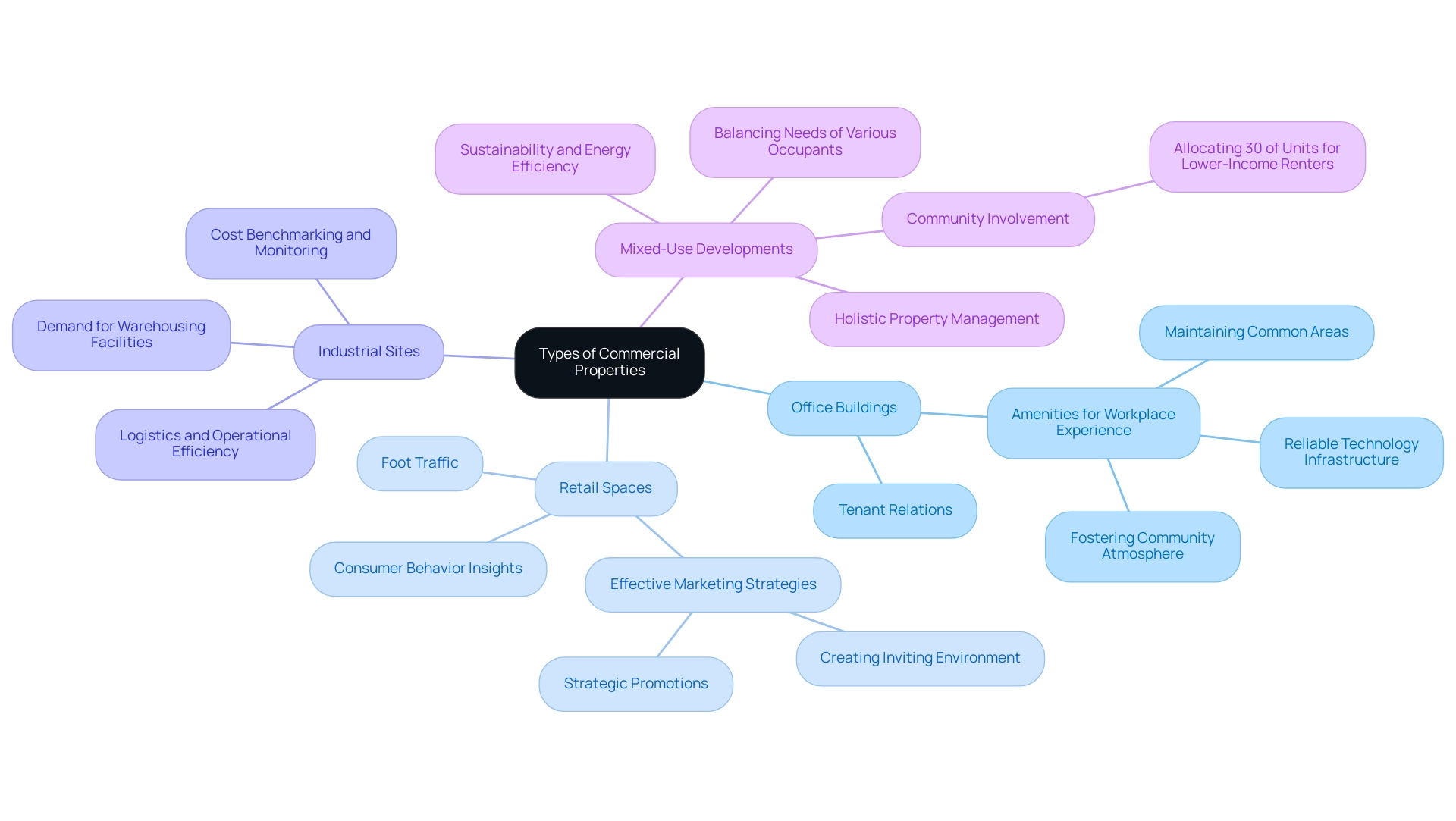
The Role of a Commercial Property Manager: Responsibilities and Skills
In 2025, the role of a commercial asset manager has evolved significantly, encompassing a wide range of responsibilities crucial for the effective operation of assets. These experts supervise daily activities, which include resident relations, lease administration, maintenance coordination, and financial oversight. As the real estate sector adjusts to transformative changes, such as the integration of AI-driven analytics and automated processes, the skill set required for success has expanded.
Key skills for a successful property manager now include:
- Strong Communication Abilities: Effective communication is essential for fostering positive tenant relationships and ensuring that all stakeholders are informed and engaged.
- Financial Acumen: A solid understanding of financial oversight is critical, as real estate managers must handle budgets, financial reporting, and negotiations.
- Problem-Solving Skills: The capability to tackle and resolve challenges swiftly is crucial, especially in upholding resident satisfaction and building standards.
- Knowledge of Regulations: Staying informed about local and national regulations ensures compliance and reduces risks related to real estate operations.
- Negotiation Skills: Proficiency in negotiating leases and contracts is essential for maximising asset value and occupant retention.
Statistics show that efficient asset oversight directly correlates with resident satisfaction and retention rates, emphasising the significance of these skills.
Naismiths’ services, including project monitoring, business restructuring, and comprehensive building consultancy, are designed to enhance operational efficiency and strengthen relationships with occupants and stakeholders. By integrating these services, real estate clients can better navigate the complexities of their roles and ensure that they meet the evolving demands of the market.
As the terrain of commercial real estate evolves, the duties of those involved in property management will increasingly involve utilising technology to improve experiences and optimise operations. This shift highlights the necessity for asset managers to adapt and enhance their skills to meet the demands of a dynamic market.
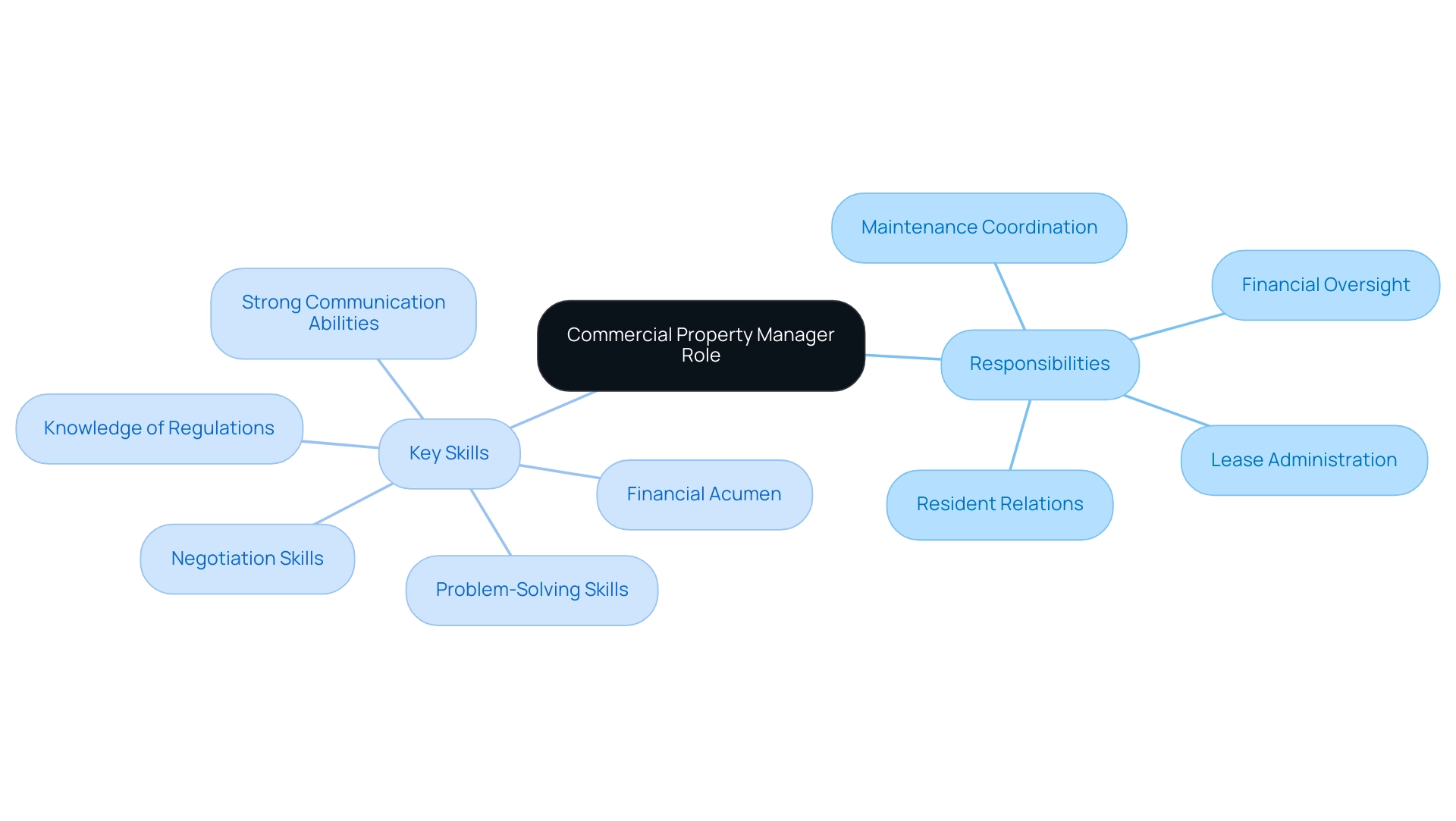
Why Professional Management Matters
Utilising expert property management services provides significant advantages for property owners, enhancing resident retention, boosting asset value, and streamlining operational procedures. Property management professionals possess specialised knowledge in strategies and maintenance coordination, all of which contribute to reduced vacancy rates and increased rental income. For example, properties under expert management typically exhibit higher levels of resident satisfaction, correlating with longer lease terms and diminished turnover costs.
Data indicates that effective property management practices can lead to a notable increase in retention rates, with certain studies revealing improvements of up to 30% in well-managed properties. This is especially vital in light of urbanisation and population growth in major UK cities, where the demand for quality housing is escalating. Moreover, as the property management landscape evolves, the integration of data-driven solutions and advanced technologies is becoming increasingly common, enhancing operational efficiency and customer satisfaction.
A recent case study on emerging trends in property oversight for 2024 underscores a transition towards more customer-centric methodologies, highlighting the significance of sustainability and energy-efficient technologies. This shift not only aligns with growing environmental responsibilities but also appeals to individuals who prioritise eco-friendly living spaces.
Expert insights underscore the necessity of implementing effective resident retention strategies. By prioritising tenant needs and fostering open lines of communication, managers can cultivate strong relationships that ultimately enhance tenant loyalty and satisfaction.
In summary, the benefits of engaging professional property management commercial services are evident: improved tenant retention, increased asset value, and a more lucrative investment landscape. As the industry continues to evolve, property owners who leverage these services, particularly those provided by Naismith advisory team, will likely gain a competitive edge in the dynamic real estate market.
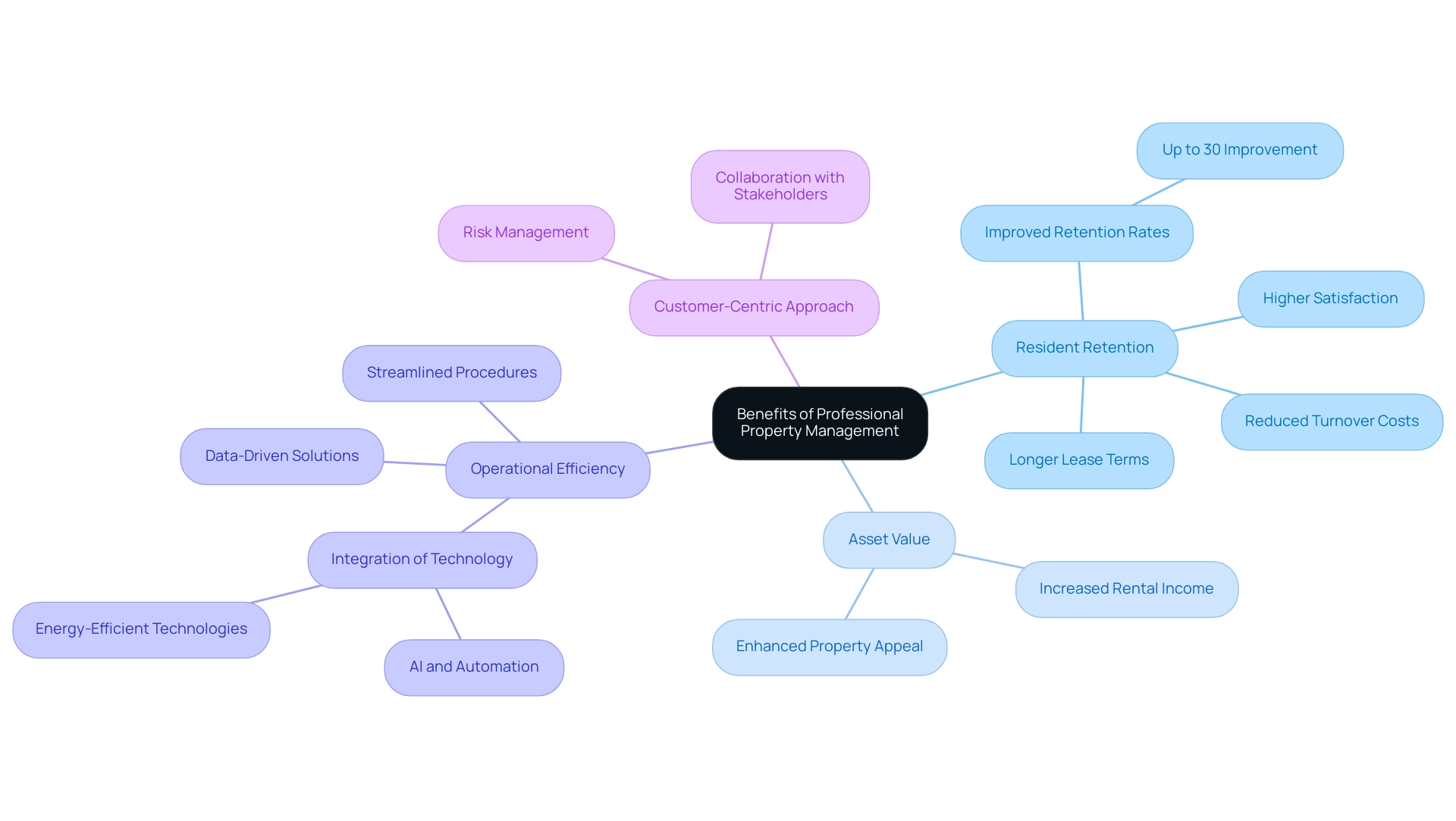
Financial Management in Commercial Property: Strategies for Success
Effective financial management is essential for the success of commercial property management, particularly in the evolving landscape of 2025. Key strategies encompass the development of comprehensive budgets, regular financial analyses, and stringent cost-control measures. Managers in real estate must prioritise precise financial reporting, providing owners with clear insights into earnings, expenditures, and overall financial performance.
Utilising advanced financial forecasting tools is crucial for anticipating market trends and making informed decisions that enhance profitability. For instance, a proactive maintenance budget can significantly reduce the likelihood of costly repairs, thereby extending the lifespan of asset holdings.
Expert opinions highlight the necessity of budgeting and financial analysis in commercial property management, with industry leaders advocating for a strategic approach to financial planning. This year’s commercial real estate outlook aims to help leaders turn the corner on the recent challenging years to better position their organisations for the road ahead. This perspective reinforces the need for adaptability in financial strategies to ensure long-term success.
Furthermore, the significance of collaborative endeavours in attaining sustainability is progressively acknowledged, motivating real estate administrators to embrace sustainable approaches that align with financial strategies. This broader context emphasises the interconnectedness of financial health and sustainable practices in commercial property management oversight.
Leveraging Technology in Commercial Property Management: Tools and Innovations
In today’s property management commercial environment, technology is not merely an improvement; it is a crucial factor in operational efficiency and tenant contentment. Property oversight software has become essential, enabling streamlined processes for lease tracking, maintenance requests, and financial reporting. Recent statistics indicate that a significant 88% of real estate executives anticipate revenue growth, underscoring the importance of adopting innovative solutions to remain competitive and drive this growth.
The integration of virtual tours and online leasing platforms has transformed renter engagement. Potential renters can now investigate listings from a distance, enhancing the leasing process’s accessibility and attractiveness. As the property management commercial sector evolves, those who adopt these technological advancements will be better positioned to meet the changing needs of residents and capitalise on market opportunities.
In 2025, the role of technology in property management commercial will continue to expand, with innovations in software and tools driving efficiency and enhancing service delivery.
Additionally, technologies like blockchain and virtual reality are set to further reshape the industry, providing new avenues for engagement and efficiency.
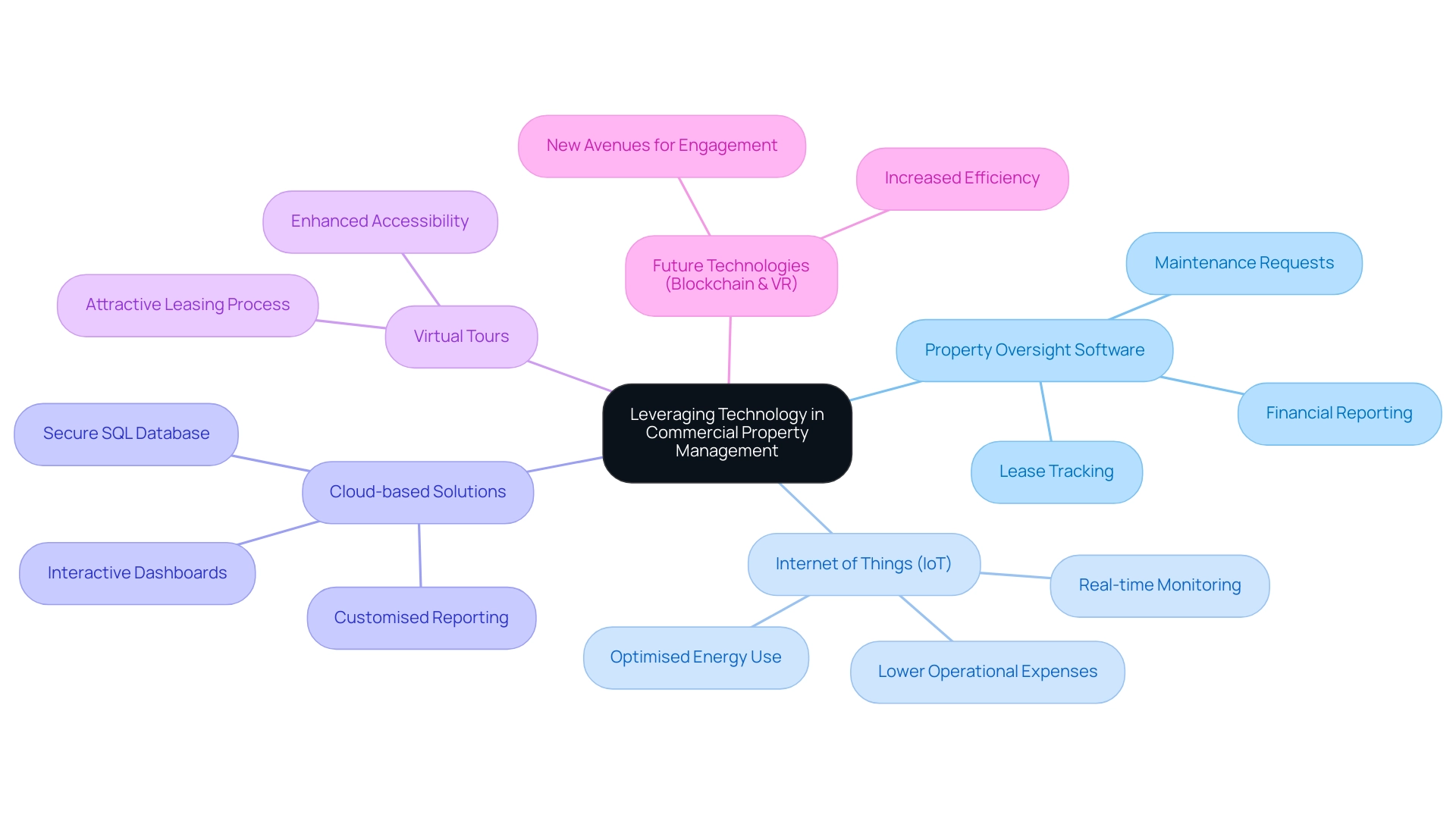
Sustainable Practices in Commercial Property Management: Meeting Modern Standards
Sustainability has emerged as a pivotal focus in commercial property management, propelled by evolving regulatory frameworks and a marked shift in tenant preferences towards eco-friendly environments. As we approach 2025, real estate managers are increasingly adopting sustainable practices that encompass:
- Energy-efficient upgrades
- Waste reduction initiatives
- Water conservation strategies
These measures not only align with environmental goals but also enhance operational efficiency and reduce costs.
The integration of green certifications, such as LEED, plays a crucial role in elevating the marketability of properties. LEED certification is especially important, as it demonstrates a commitment to sustainability and can result in enhanced occupant satisfaction and retention. For instance, a mixed-use office complex achieved LEED Platinum certification in 2023 by implementing a comprehensive sustainability strategy, resulting in a 25% reduction in energy consumption and a 15% decrease in water use.
This initiative not only attracted high-profile corporate occupants but also secured local utility rebates and leveraged tax credits for its solar energy system, showcasing the financial benefits of sustainable practices.
Moreover, data indicates that occupants, particularly in the corporate sector, are increasingly seeking buildings that align with their sustainability goals. “Tenants, especially in the corporate sector, increasingly sought out buildings that align with their own sustainability goals.” This trend highlights the significance of eco-friendly practices for real estate administrators, as they can greatly impact tenant preferences and improve asset value.
As investment fund managers prioritise net-zero standards, the demand for sustainable commercial real estate and effective property management practices is expected to rise, making it imperative for managers to adopt and promote eco-friendly strategies.
In summary, the commitment to sustainability in commercial property management not only contributes to environmental conservation but also fosters a competitive advantage in the market, ensuring that assets meet the evolving expectations of occupants and investors alike.
Challenges in Commercial Property Management: Navigating a Dynamic Landscape
In today’s dynamic environment, property management supervisors encounter a multitude of challenges, including fluctuating market conditions, rising operational expenses, and evolving tenant expectations. The emergence of remote work has significantly transformed the demand for office space, compelling leaders to rethink their strategies to accommodate this new reality. As organisations adapt to hybrid work models, the demand for flexible leasing options has surged, prompting real estate professionals to innovate in their offerings.
Moreover, adherence to an ever-evolving regulatory environment presents an ongoing challenge. To effectively navigate these complexities, real estate supervisors must remain vigilant to market trends and invest in ongoing education. The multifamily housing sector, for instance, is projected to experience a steady growth rate of 7% over the next three years, indicating opportunities for savvy managers who can adapt to changing demands.
Utilising technology is also crucial for optimising operations and enhancing resident experiences. The property management commercial industry is poised for transformative changes, driven by increased adoption of AI-driven analytics and automated processes. These advancements not only improve efficiency but also facilitate personalised tenant services, which are becoming increasingly important in attracting and retaining residents. A customer-centric approach is vital in addressing these challenges.
The Future of Commercial Property Management: Trends and Predictions
The landscape of property management commercial oversight is poised for a significant transformation, driven by rapid technological advancements, a heightened focus on sustainability, and evolving occupant expectations. As we approach 2025, several key trends are emerging that will shape the future of this sector.
One of the most pivotal trends is the integration of artificial intelligence (AI) and automation into asset management processes. These technologies are set to revolutionise operational efficiency, enabling real estate administrators to optimise tasks such as resident communication, maintenance requests, and financial reporting. By leveraging AI-driven analytics, managers can gain deeper insights into tenant behaviour and preferences, fostering enhanced engagement and satisfaction.
Sustainability emerges as another critical factor influencing change in property management commercial real estate. In this context, property supervisors will need to adapt to more stringent regulations and implement sustainability initiatives that not only comply with legal requirements but also resonate with environmentally conscious tenants.
Expert opinions underscore the significance of these developments. Industry leaders emphasise that managers who proactively embrace changes in property management commercial will be better equipped to navigate the complexities of the evolving commercial real estate landscape.
As we progress, the forecasts for technology application in real estate oversight are promising. The impact of AI and automation will not only streamline processes but also enhance decision-making capabilities, allowing managers to respond swiftly to market changes and tenant needs. Those who successfully adapt to these technological advancements, supported by Naismiths’ advisory services, will undoubtedly thrive in the competitive landscape of property management commercial.
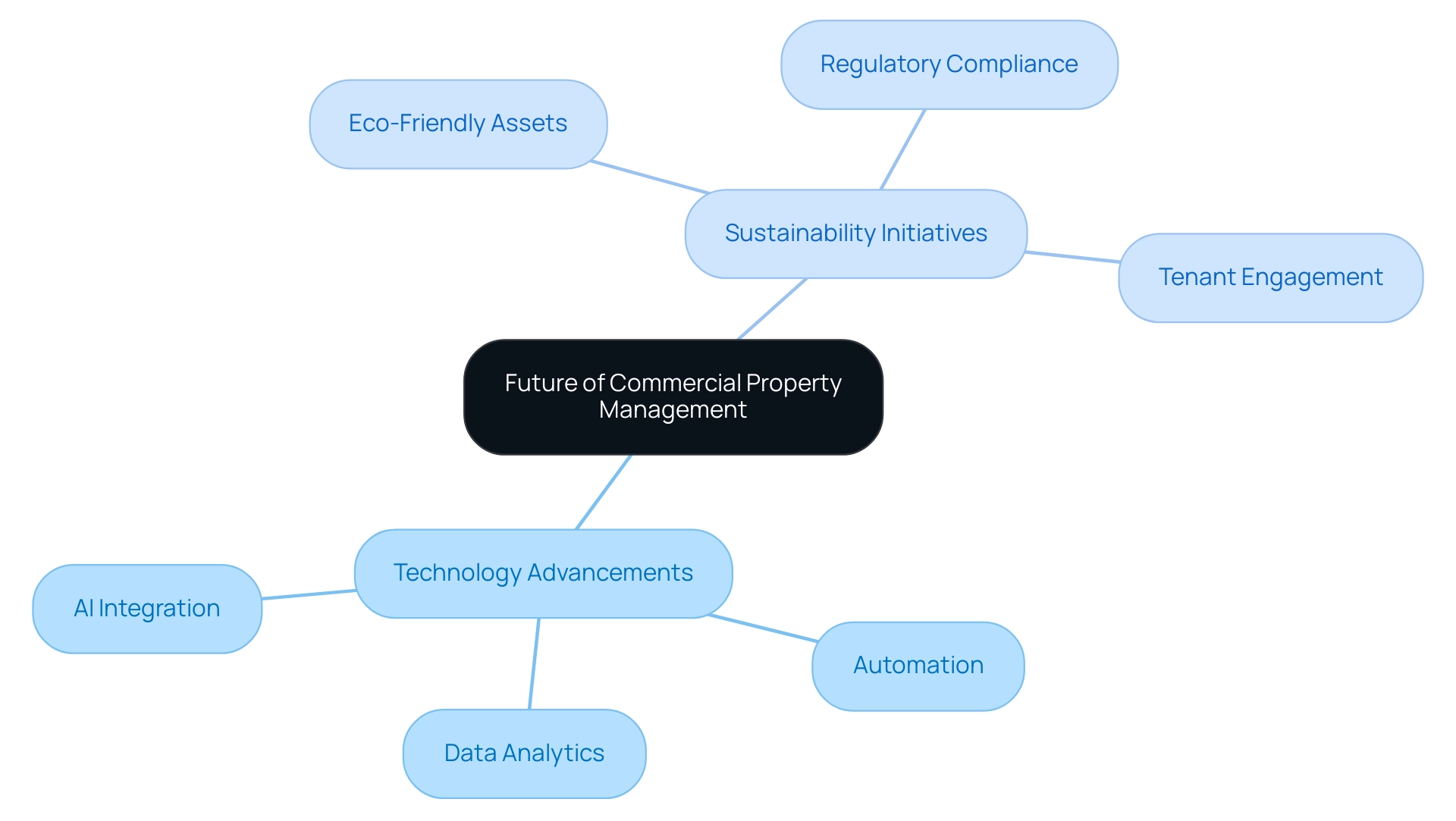
Conclusion
In the rapidly evolving landscape of commercial property management, the significance of comprehending its complexities and adapting to emerging trends is paramount. Effective management is pivotal for maximising property value and tenant satisfaction, as highlighted throughout this article. Urbanisation continues to drive demand, and technological advancements are reshaping operations, compelling property managers to adopt innovative strategies to remain competitive.
The diverse nature of commercial properties necessitates tailored management approaches that address specific needs, ranging from enhancing tenant experiences in office spaces to optimising logistics in industrial facilities. Professional management services not only improve tenant retention rates but also bolster property values, making them a worthwhile investment for owners navigating today’s dynamic market.
Furthermore, the integration of technology and sustainable practices is becoming increasingly crucial. Property managers who leverage advanced tools and prioritise eco-friendly initiatives are better positioned to meet the expectations of modern tenants, particularly as the demand for sustainable properties grows. This shift towards a customer-centric, tech-driven approach reinforces the essential role of property managers in ensuring operational efficiency and fostering strong tenant relationships.
Ultimately, as the commercial property management sector looks toward 2025, the ability to adapt to regulatory changes, market fluctuations, and evolving tenant preferences will define success. By embracing innovation and prioritising collaboration, property managers can effectively navigate the complexities of the industry, ensuring long-term growth and satisfaction for all stakeholders involved.